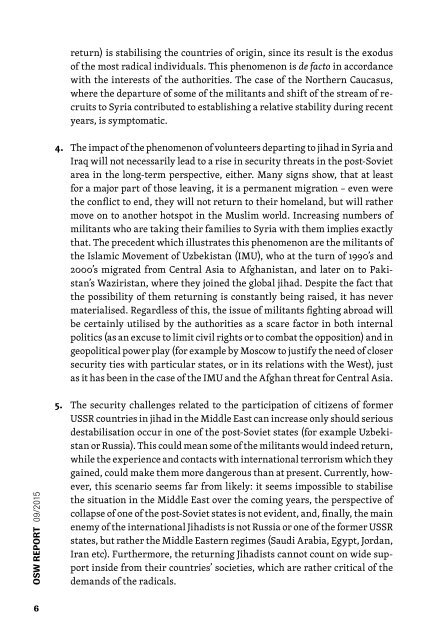HOMO JIHADICUS
homojihadicus
homojihadicus
Create successful ePaper yourself
Turn your PDF publications into a flip-book with our unique Google optimized e-Paper software.
eturn) is stabilising the countries of origin, since its result is the exodus<br />
of the most radical individuals. This phenomenon is de facto in accordance<br />
with the interests of the authorities. The case of the Northern Caucasus,<br />
where the departure of some of the militants and shift of the stream of recruits<br />
to Syria contributed to establishing a relative stability during recent<br />
years, is symptomatic.<br />
4. The impact of the phenomenon of volunteers departing to jihad in Syria and<br />
Iraq will not necessarily lead to a rise in security threats in the post-Soviet<br />
area in the long-term perspective, either. Many signs show, that at least<br />
for a major part of those leaving, it is a permanent migration – even were<br />
the conflict to end, they will not return to their homeland, but will rather<br />
move on to another hotspot in the Muslim world. Increasing numbers of<br />
militants who are taking their families to Syria with them implies exactly<br />
that. The precedent which illustrates this phenomenon are the militants of<br />
the Islamic Movement of Uzbekistan (IMU), who at the turn of 1990’s and<br />
2000’s migrated from Central Asia to Afghanistan, and later on to Pakistan’s<br />
Waziristan, where they joined the global jihad. Despite the fact that<br />
the possibility of them returning is constantly being raised, it has never<br />
materialised. Regardless of this, the issue of militants fighting abroad will<br />
be certainly utilised by the authorities as a scare factor in both internal<br />
politics (as an excuse to limit civil rights or to combat the opposition) and in<br />
geopolitical power play (for example by Moscow to justify the need of closer<br />
security ties with particular states, or in its relations with the West), just<br />
as it has been in the case of the IMU and the Afghan threat for Central Asia.<br />
PRACE OSW REPORT OSW 09/2012 09/2015<br />
5. The security challenges related to the participation of citizens of former<br />
USSR countries in jihad in the Middle East can increase only should serious<br />
destabilisation occur in one of the post-Soviet states (for example Uzbekistan<br />
or Russia). This could mean some of the militants would indeed return,<br />
while the experience and contacts with international terrorism which they<br />
gained, could make them more dangerous than at present. Currently, however,<br />
this scenario seems far from likely: it seems impossible to stabilise<br />
the situation in the Middle East over the coming years, the perspective of<br />
collapse of one of the post-Soviet states is not evident, and, finally, the main<br />
enemy of the international Jihadists is not Russia or one of the former USSR<br />
states, but rather the Middle Eastern regimes (Saudi Arabia, Egypt, Jordan,<br />
Iran etc). Furthermore, the returning Jihadists cannot count on wide support<br />
inside from their countries’ societies, which are rather critical of the<br />
demands of the radicals.<br />
6


